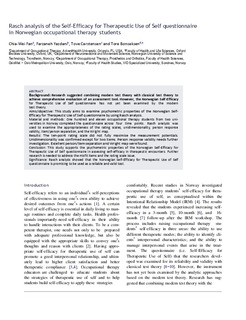Rasch analysis of the self-efficacy for therapeutic use of self in occupational therapy students
Journal article, Peer reviewed
Accepted version

Åpne
Permanent lenke
http://hdl.handle.net/11250/2642133Utgivelsesdato
2020Metadata
Vis full innførselSamlinger
Sammendrag
Background: Research suggested combining modern test theory with classical test theory to achieve comprehensive evaluation of an assessment tool. However, the Norwegian Self-Efficacy for Therapeutic Use of Self questionnaire has not yet been examined by the modern test theory.
Aims/objective: This study aims to examine psychometric properties of the Norwegian Self-Efficacy for Therapeutic Use of Self questionnaire by using Rasch analysis.
Material and methods: One hundred and eleven occupational therapy students from two universities in Norway completed the questionnaire across four time points. Rasch analysis was used to examine the appropriateness of the rating scales, unidimensionality, person response validity, item/person separation, and the Wright map.
Results: The ten-point rating scale did not fully maximise the measurement potentials. Unidimensionality was confirmed except for two items. Person response validity needs further investigation. Excellent person/item separation and Wright map were found.
Conclusion: This study supports the psychometric properties of the Norwegian Self-Efficacy for Therapeutic Use of Self questionnaire in assessing self-efficacy in therapeutic encounters. Further research is needed to address the misfit items and the rating scale issue.
an Self-ESignificance: Rasch analysis showed that the Norwegifficacy for Therapeutic Use of Self questionnaire is promising to be used as a reliable and valid tool.